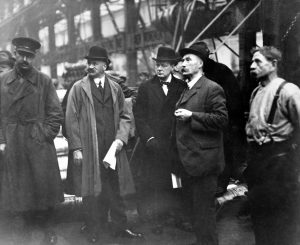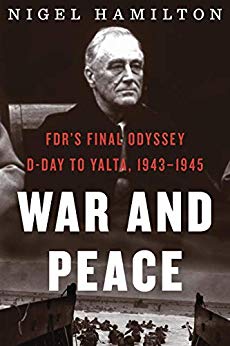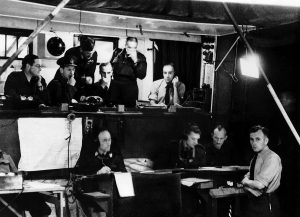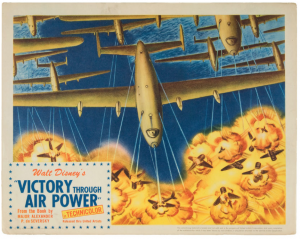
Finest Hour 185
Books, Arts, & Curiosities – Fight to the Finish

August 21, 2019
Finest Hour 185, Third Quarter 2019
Page 45
Review by Richard A. McConnell
Richard A. McConnell is Associate Professor of Tactics at the US Army Command and General Staff College.
Nigel Hamilton, War and Peace: FDR’s Final Odyssey, D-Day to Yalta, 1943–1945, Houghton Mifflin Harcourt, 2019, $30.00. ISBN 978-0544876804
This Republic had its beginning…under the protection of certain unalienable political rights…these political rights proved inadequate to assure us equality in the pursuit of happiness. We have come to a clear realization of the fact that true individual freedom cannot exist without economic security and independence. Necessitous men are not free men. People who are hungry and out of a job are the stuff of which dictatorships are made. All of these rights spell security, and after this war is won we must be prepared to move forward, in the implementation of these rights, to new goals of human happiness and well-being.
Thus President Franklin D. Roosevelt in his 1944 State of the Union address introduced what he called the second bill of rights. These comments reflect key values that drove his vision for a new world order following the Second World War. FDR’s continued emphasis that Americans must care about social issues beyond their own borders laid the foundation for the United Nations. We are the beneficiaries of FDR’s views of enlightened self-interest.

2024 International Churchill Conference
This is the third and final installment of Nigel Hamilton’s biography of FDR during the war, and it is well worth the read. (See reviews of vol. I in FH 168 and vol. II in FH 176.) Hamilton crafts a gripping tale of how this visionary leader guided the world to final victory against the Axis as his health steadily got worse. FDR’s vision, eloquence, diplomacy, and charming ability to connect diverse perspectives is frankly hard to match in modern history. Hamilton deftly guides the reader through the momentous years of 1943 through 1945 encompassing incredible accomplishments in a context where the stakes could not have been higher while guiding a coalition of the barely willing.
One could hardly find a more unlikely coalition anywhere in the history of mankind. FDR managed to hold Churchill and Stalin together as an alliance against the Axis powers through some of the most contentious debates imaginable. Churchill was an open critic of communism with an established record of anti-Communist rhetoric. Stalin was the extremely authoritarian dictator of the Soviet Union and distrustful of anyone. Somehow FDR was able to bring these incredibly diverse perspectives together to a unified purpose towards a postwar world that most people at the time could not even imagine.
Hamilton continues his description of the close yet often contentious relationship between FDR and Churchill. FDR had his hands full trying to prove to Stalin that a Western front through France would be opened, all the while fighting off repeated attempts to prevent it by Churchill. Readers who are fans of Churchill might think this book overly critical of the beleaguered Prime Minister who stood and faced down Nazi Germany in 1940. That simply is not the case. Both Churchill and FDR are depicted as incredible visionary leaders, yet men with feet of clay. The sheer diversity of sources that Hamilton marshals in this final work depicting FDR’s impact on world history continues to amaze, as it does in his earlier volumes. This book contains descriptions provided from personal journals, public records, and radio broadcasts to name just a few. Especially fascinating is Hamilton’s ability to include journal entries from the Nazi propaganda minister Joseph Goebbels. Such sources provide a breadth and depth to this narrative that discusses not only the facts about what happened, but what people believed at the time about those events. Among the most important events during this time were the conferences at Tehran and Yalta, as well as the invasion of Western Europe: D-Day.
It is hard today to imagine just how difficult travel was during the war even for the able-bodied. Imagine someone who is wheelchair-bound enduring a 1400-mile journey that incorporated sea, air, and motor travel. Add to this the fact that FDR’s health was continuing to plummet throughout this time, and you have the makings of an incredibly dramatic story. How FDR successfully obtained, if not always consensus, at least cooperation establishing D-Day in Tehran, despite Churchill’s continuing objections, was amazing. The fact that FDR was able to chair an almost weeklong conference at Yalta setting the foundational agreements for the end of the war and the establishment of the United Nations was a pivotal event in world history. That he was able to achieve such accomplishments after a fatal diagnosis of heart failure a year earlier borders on superhuman. Hamilton puts the reader at FDR’s side throughout these incredible accomplishments as if the reader were present to observe them unfolding.
Nigel Hamilton has created a masterwork in War and Peace that readers will find hard to put down. His writing style is engaging and well- researched, and it provides insights that even the best read historians might find surprising and new. Among the most important is a deeper understanding of the foundations of the world that we live in. FDR’s charming diplomacy is refreshing today when competing interests, inflammatory rhetoric, brinkmanship, and the emphasis of national interest seems to rule. It is not just FDR’s ability to bring together diverse interests that makes this engaging. War and Peace reminds readers of what national leaders were able to accomplish when they worked to find common ground. Perhaps it is time we re-examine FDR’s ability to honor human rights beyond America and around the world.
Subscribe
WANT MORE?
Get the Churchill Bulletin delivered to your inbox once a month.




